

Nintendo Entertainment Analysis and Development. Nintendo EAD is split into three different departments: the Kyoto Software Development Department, which is split into five separate groups; the Tokyo Software Development Department, which is split into two separate groups; and the Technology Development Department which is split into two separate teams in Kyoto.
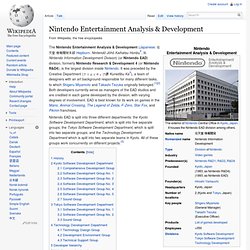
All of these groups work concurrently on different projects.[3] History[edit] This department branch is the premiere resource of internal software development at Nintendo. The house that built Mario and Link currently occupies the largest portion of R&D personnel, all scattered across seven distinct development groups, and spanning offices in Kyoto and Tokyo. The department was initially created in 1983 when Hiroshi Yamauchi decided to build a new creative department focusing around star designer Shigeru Miyamoto. In the early 2000s, the old hierarchy of EAD began welcoming a new class of managers. Shigeru Miyamoto. Shigeru Miyamoto (宮本 茂, Miyamoto Shigeru?
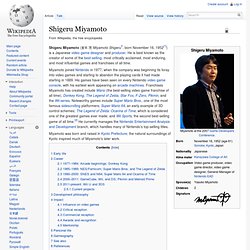
, born November 16, 1952[1]) is a Japanese video game designer and producer. He is best known as the creator of some of the best-selling, most critically acclaimed, most enduring, and most influential games and franchises of all time. Miyamoto was born and raised in Kyoto Prefecture; the natural surroundings of Kyoto inspired much of Miyamoto's later work. Early life Miyamoto was born in the Japanese town of Sonobe, a rural town northwest of Kyoto,[3] on November 16, 1952. Miyamoto graduated from Kanazawa Municipal College of Industrial Arts with a degree in industrial design[3] but no job lined up.
Western genre television shows had a major influence on Miyamoto.[8] Career 1977–1984: Arcade beginnings; Donkey Kong Nintendo, a relatively small Japanese company, had traditionally sold playing cards and other novelties, although it had started to branch out into toys and games in the mid 1960s. 1990–2000: SNES and N64; Super Mario 64 and Ocarina of Time. Nintendo Software Planning & Development. Nintendo Network Service Development. Nintendo Software Technology. Nintendo Software Technology (or NST) is an American video game developer located inside of Nintendo of America main headquarters, based in Redmond, Washington.
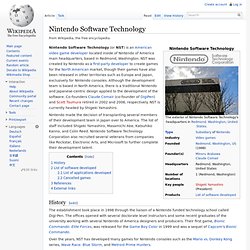
NST was created by Nintendo as a first-party developer to create games for the North American market, though their games have also been released in other territories such as Europe and Japan, exclusively for Nintendo consoles. Although the development team is based in North America, there is a traditional Nintendo and Japanese-centric design applied to the development of the software.
Co-founders Claude Comair (co-founder of DigiPen) and Scott Tsumura retired in 2002 and 2006, respectively. NST is currently headed by Shigeki Yamashiro. Nintendo made the decision of transplanting several members of their development team in Japan over to America. History[edit] Over the years, NST has developed many games for Nintendo consoles such as the Mario vs.
DigiPen's Main Campus was based in the same building as theirs until 2010. Nintendo Software Design & Development. Monolith Soft. Monolith Soft, Inc.
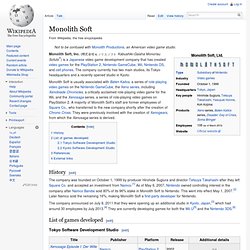
(株式会社モノリスソフト, Kabushiki-Gaisha Monorisu Sofuto?) Retro Studios. History[edit] 1998–2002: Creation and Metroid Prime[edit] Retro Studios was founded in October 1998 as an alliance between Nintendo and former Iguana Entertainment founder Jeff Spangenberg.
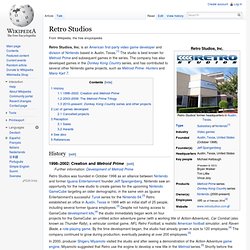
Nintendo saw an opportunity for the new studio to create games for the upcoming Nintendo GameCube targeting an older demographic, in the same vein as Iguana Entertainment's successful Turok series for the Nintendo 64.[3] Retro established an office in Austin, Texas in 1999 with an initial staff of 25 people, including several former Iguana employees.[3] Despite not having access to GameCube development kits,[4] the studio immediately began work on four projects for the GameCube: an untitled action adventure game (with a working title of Action-Adventure), Car Combat (also known as Thunder Rally), a vehicular combat game, NFL Retro Football, a realistic American football simulator, and Raven Blade, a role-playing game. 2003–2009: The Metroid Prime Trilogy[edit]
Brownie Brown. 1-UP Studio Co., Ltd. (1‐UPスタジオ株式会社, Wan-Appu Sutajio Kabushiki Gaisha?)
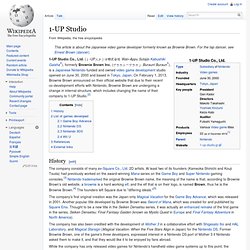
, formerly Brownie Brown Inc. Intelligent Systems. History[edit] Intelligent Systems started out in the video game industry when developer Tohru Narihiro was hired by Nintendo to port Famicom Disk System software to the standard ROM-cartridge format that was being used by the NES outside Japan.
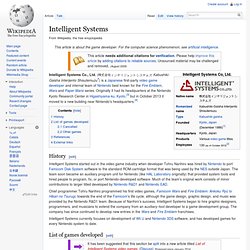
Nd Cube. Nd Cube Co., Ltd.
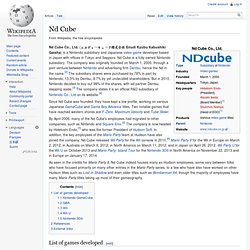
(エヌディーキューブ株式会社 Enudī Kyūbu Kabushiki Gaisha) is a Nintendo subsidiary and Japanese video game developer based in Japan with offices in Tokyo and Sapporo. Nd Cube is a fully owned Nintendo subsidiary. The company was originally founded on March 1, 2000, through a joint venture between Nintendo and advertising firm Dentsu, hence the Nd in the name.[2] The subsidiary shares were purchased by 78% in part by Nintendo, 13.3% by Dentsu, 8.7% by yet undecided shareholders. HAL Laboratory. HAL Laboratory started off making games for the MSX system and the Commodore VIC-20.[4] In many of its games during the early to mid-1990s it used the name HALKEN (derived from their literal Japanese name "HAL KENkyūjo") as well as HAL Laboratory.
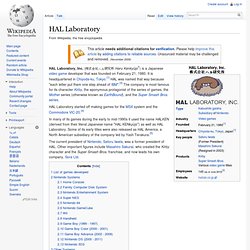
Some of its early titles were also released as HAL America, a North American subsidiary of the company led by Yash Terakura.[5] The current president of Nintendo, Satoru Iwata, was a former president of HAL. Other important figures include Masahiro Sakurai, who created the Kirby character and the Super Smash Bros. franchise, and now leads his own company, Sora Ltd.
Project Sora. Project Sora (プロジェクトソラ株式会社, Purojekuto Sora Kabushiki Gaisha?)
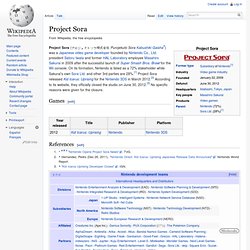
Was a Japanese video game developer founded by Nintendo Co., Ltd. president Satoru Iwata and former HAL Laboratory employee Masahiro Sakurai in 2009 after the successful launch of Super Smash Bros. Brawl for the Wii console. On its formation, Nintendo is listed as a 72% stakeholder while Sakurai's own Sora Ltd. and other 3rd parties are 28%.[1] Project Sora released Kid Icarus: Uprising for the Nintendo 3DS in March 2012.[2] According to its website, they officially closed the studio on June 30, 2012.[3] No specific reasons were given for the closure.